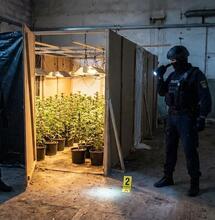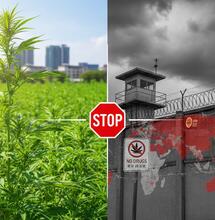Will Thailand Back Down on Cannabis Recriminalization?

It looks like Thailand authorities are changing their mind again on cannabis. Thailand’s Prime Minister Srettha Thavisin has allegedly agreed to follow the path of cannabis legislation instead of relisting the plant as a narcotic. Mr. Srettha has previously pledged to stop the recreational use of marijuana as part of his political campaign for last year’s general elections in Thailand.
Thailand may choose to control cannabis through legislation instead of re-listing it as a narcotic, which is equal to recriminalization, according to Deputy Prime Minister Anutin Charnvirakul, the Bangkok Post reported.
The change of heart among Bangkok’s leading politicians follows after months of hostile rhetoric toward the free use of weed in the country, which created anxiety and panic among many cannabis business owners and industry players.
Another Cannabis Policy U-Turn for Thailand?
It’s not that easy to turn back the clock on cannabis legalization after all. The bold plan to prohibit marijuana, merely two years after its historic decriminalization in Thailand, has led to a political rift in PM Srettha’s Thavisin’s coalition government. The PM has now sent the first signals to the public that he may be rethinking his decisions on cannabis and its future.
“I would like to thank the prime minister for considering this issue and deciding to enact an act,” said Deputy Prime Minister Mr. Anutin, according to the Bangkok Post.
The PM reportedly already gave guidelines to enforce a bill to control marijuana instead of re-adding the plant in the narcotics list. While it’s unclear what might be in that new bill, the move is interpreted as a clear signal that the ship is now sailing in a slightly different direction.
In the beginning of July, a drug control committee with the Ministry of Public Health approved a proposal to put back cannabis on the list of narcotics, as instructed by Mr. Srettha. The rule proposal was due to be sealed with the Narcotics Control Board, but a last minute meeting between Srettha, Anutin, and other ministers, prevented that from happening.
If the Narcotics Control Board approved the decision, cannabis would have become illegal once again in Thailand starting January 1, 2025. However, the issue may be further debated in parliament and the threat of recriminalization lingers on. This was just a small victory, of course cheered by cannabis advocates and organizations in Thailand.
Srettha’s uneasy plan on cannabis has sparked a conflict between Thailand’s leading party and the second-largest party in the coalition, the Bhumjaithai, which worked hard to end cannabis prohibition. The driving force behind the decriminalization and removing the plant from the notorious list of narcotics was exactly the current Deputy PM, Anutin Charnvirakul, who served as a public health minister in the previous government.
Unfortunately, the previous Thai government did not secure a bill that will regulate growing and retail of marijuana. The Bhumjaithai party drafted a bill to fill in the legal vacuum, but that bill never found its way for a vote in the parliament. When the party lost power in last year’s elections, it was already too late to cement the legal status of cannabis.
Are Other Countries Going to Follow Thailand, with a Cannabis Future?
Despite the legal ambiguity around the plant, cannabis started with a bang in Thailand. The streets of Bangkok as well as other hot tourist spots were quickly peppered with lavish and spectacular cannabis dispensaries and clinics. Weed is now sold on every corner, and traditional Thai meals are reinvented with the new green ingredient.
Srettha’s Pheu Thai party wants to eliminate or at least downsize the budding sector, endangering the future of cannabis in Thailand. But the two years of liberation have opened the greater question whether anyone else in the region will enter the stage. Will other Southeast Asian countries try to change their rigid rules on cannabis as well?
High-profile politicians from Malaysia and Indonesia have already given statements that their respective governments are assessing if they might as well introduce cannabis legalization for medicinal use. Malaysia has even sent its former health minister on a work visit to Thailand to learn more about medical cannabis, The Conversation reported.
Japan is another example where the authorities have finally started to ease up on the rules a little bit. They recently voted to change the national cannabis regulation for the first time in eight decades amid growing demand for CBD medicines in the island nation.
Cannabis breakthrough in Asia will definitely continue through the rest of the decade. Thailand may not be the ideal example of how to implement cannabis legislation, but its neighbors can always look for ideas and solutions somewhere else. They can evaluate models from other legal countries overseas and see if a particular legalization model could work for them. In the meantime, hopefully, Thailand approves a bill that can help exercise better control over the country’s exciting weed market, and stop flip-flopping its policies on cannabis.
Also read on Soft Secrets:
- The Sun Finally Rises for the Japanese Cannabis Market















